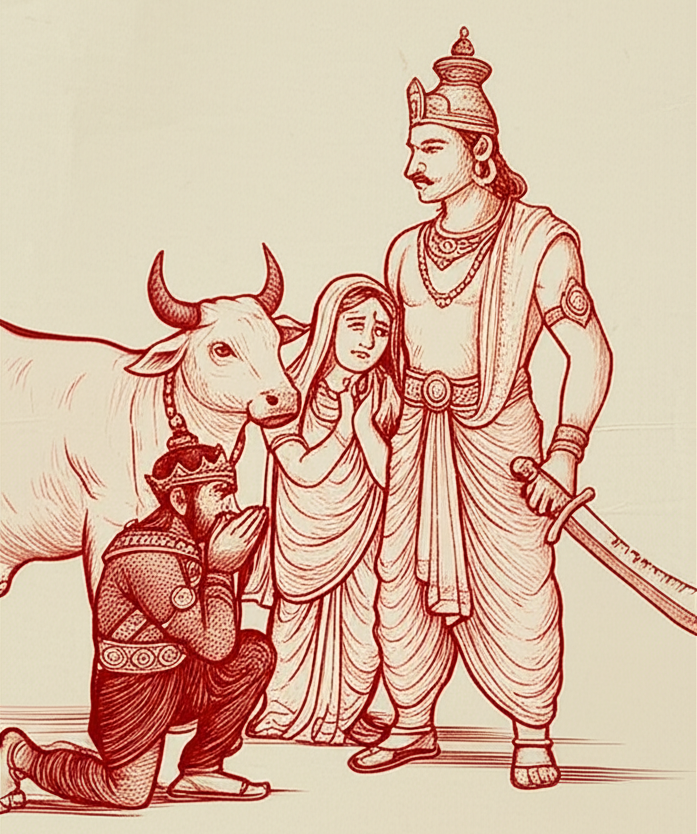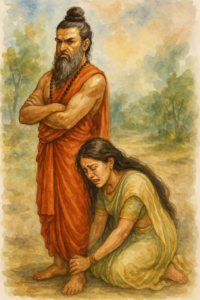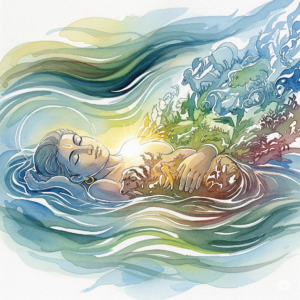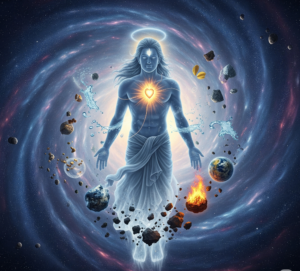Imagine a world at a turning point—a society caught between the fading glory of righteousness and the creeping shadows of deceit and moral decay. Sounds familiar, doesn’t it? Think of today’s relentless news cycles filled with stories of corruption, greed, and conflict, or the ever-growing allure of shortcuts in life. Now, rewind to an era when King Parikshit, the last flame of the Pandavas’ legacy, faced a similar dilemma during the dawn of Kali Yuga—the epoch marked by vice and discord.
This is no ordinary tale of kings and kingdoms. It’s a mirror reflecting timeless questions we all grapple with. How do we uphold truth when deceit thrives? How do we foster compassion in a world ruled by greed? In the poignant encounter between Parikshit and the cosmic forces of Dharma, Prithvi, and Kali, you’ll find echoes of your daily struggles—whether battling temptation, seeking balance, or striving for integrity.
His actions reveal powerful lessons about navigating chaos, setting boundaries, and standing firm in integrity. Step into this ancient tale that mirrors our modern struggles and discover timeless wisdom to light your path.
Raja Parikshit’s Era
Long after the Pandavas departed to the heavens, their legacy of righteous governance lived on through King Parikshit, the grandson of Arjuna. Endowed with divine virtues and wisdom imparted by the foremost Brahmins, Parikshit ruled his kingdom with benevolence. Under his rule, justice, truth, and moral uprightness prevailed, akin to the golden age. Married to Iravati, Parikshit was blessed with sons, the eldest being the great Janamajaya, who would later carry forward his lineage.
As the ruler of Hastinapur, Parikshit ensured that the principles of the Dharma guided his reign. Under the tutelage of his preceptor Kripacharya, he performed three grand Ashvamedha yagyas on the bank of the Ganges, dedicating the merits to the welfare of the world. Yet, lurking in the shadows was the onset of the Kali Yuga—a time foretold to be fraught with moral decay, falsehood, and discord.
Parikshit, though saddened by the arrival of Kali Yuga, saw it as an opportunity to reaffirm his commitment to Dharma. Riding across his kingdom, he sought to cleanse his realm of all traces of Adharma.
The Plight of Dharma and Prithvi
On one of his journeys, he came across a harrowing scene by the banks of the sacred Saraswati River. There stood a cow and a bull—Prithvi, the Earth personified, and Dharma, the embodiment of righteousness.
The bull, once majestic, was limping on a single leg. The cow, distressed, wept bitterly, her frailty an evident sign of sorrow. In front of them stood a dark figure—a Shudra, dressed as a king, ruthlessly striking the cow and the bull. This figure was none other than the embodiment of Kali Yuga.
King Parikshit, overwhelmed with anger, swiftly dismounted his chariot. Drawing his bow, he demanded, “Who dares harm these sacred beings in my kingdom?”
The Conversation of Sorrow and Truth
Before confronting the Shudra, Parikshit turned to the bull and cow. “Who are you? Why are you in this pitiable state?” he asked.
The bull, his voice filled with lament, spoke: “I am Dharma. In the era of Satya Yuga, I stood tall on four legs—asceticism, purity, compassion, and truth. But as the ages turned, Adharma chipped away at my foundation. Three legs are broken. Only truth sustains me now, but even it trembles under the weight of deceit.”
The cow, her voice heavy with sorrow, said, “I am Prithvi, the Earth. The Lord Himself—Shree Krishna—graced me with His divine presence, relieving my burden and restoring joy. But now, in His absence, darkness looms. The virtues He upheld—compassion, truth, forgiveness, and renunciation—are eroding.”
Their grief reflected the state of the world itself—struggling under the vices of Kali Yuga.
Parikshit Confronts Kali Yuga
King Parikshit, with fiery determination, turned to Kali Yuga. Drawing his sword, he proclaimed, “You, who embody deceit and wickedness, have no place in my kingdom!”
Realizing that Parikshit sought to destroy him, Kali Yuga fell at his feet, pleading, “O King, you are known for your protection of the helpless. Grant me refuge!”
Moved by the plea, Parikshit relented but with conditions. “You shall not reside freely in my kingdom as this kingdom is governed by Dharma and Shree Hari resides here. Kali then requested for places he can reside with his permission. As Kali was a refuge, King Parikshit said I permit you to dwell only in five places: where gambling thrives, where intoxicants flow, where women are exploited, where violence and deceit reign, and in gold, the root of greed and discord.”
Thus confined, Kali Yuga began residing in these five places. Parikshit restored Dharma to his former glory by reinstating his lost legs—asceticism, purity, and compassion—and assured Prithvi that as long as he ruled, truth and righteousness would prevail.
Closing Thoughts
King Parikshit’s story offers profound lessons. Even in the darkest times, truth—the final leg of Dharma—remains. It is a beacon of hope, reminding us of the enduring strength of righteousness. It is not the age we live in but our choices that define the era’s character. In today’s world, riddled with distractions and temptations, choosing truth, compassion, and purity is both a challenge and a necessity. Like Parikshit, we must confront the vices within and around us and strive to create a space where virtue flourishes.
The five abodes of Kali—gambling, intoxication, exploitation, violence, and greed—remain the root causes of societal decay. They manifest in myriad ways, from unethical practices to the erosion of community bonds. Just as King Parikshit set boundaries to contain these vices, we, too, must set personal and societal boundaries to uphold moral and ethical values.
This story is a timeless reminder that while evil persists, the path of Dharma—when upheld—transcends time and ensures the welfare of all. Let us strive to be the Parikshit of our times, wielding truth as our sword and compassion as our shield.



